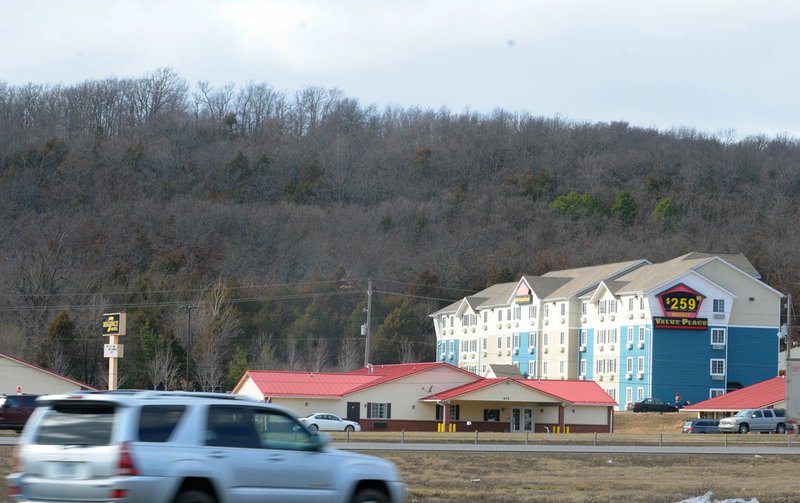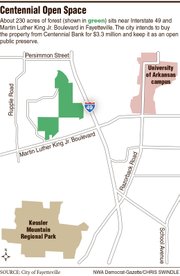FAYETTEVILLE — Preserving nearly 230 acres of mountain in the heart of the city will attract hundreds of bikers yearly, provide educational and recreational opportunities for children and preserve a natural habitat forever, officials say.
The agreement
Outputs:
• The city will buy the 228 acres owned by Centennial Bank.
• With the grant agreement, the city will support and allow at least 8-10 miles of natural surface trails for use by hikers, bikers and runners to be constructed on the property in accordance with a Walton Family Foundation prepared trail plan.
• The city will fully acquire and take ownership of the property.
• The city will permanently place the 228 acres into the public domain and preserve the land as open space in perpetuity, sufficiently allowing for natural surface and Razorback Greenway trail development and other amenities typical for a park or open space.
Outcomes:
• The city will agree to contribute to the property acquisition through a program-related investment loan from the Walton Family Foundation in the amount of $1,651,125 to be paid back over a five-year period in equal installments of $275,187.
• The city will commit to maintain the property and to maintain and operate all future greenway and natural-surface trails on the property to the same standard as outlined in the Razorback Greenway operations and management plan, as well as the guidelines listed in the International Mountain Bicycling Association “Guide to Sweet Single-Track” and “Managing Mountain Biking” handbooks.
• The city will amend its trails plan to incorporate a future greenway trail links to the property.
Source: City of Fayetteville
The City Council on Tuesday will consider accepting a 50-50 matching grant from the Walton Family Foundation to purchase the 228-acre Centennial Open Space property near Interstate 49 and Martin Luther King Jr. Boulevard for $3.3 million. The acreage, known topographically as Millsaps Mountain and formerly referred to as Mountain Ranch, would become part of the public domain with a series of single-track and soft trails.
The foundation has already given the city the go-ahead to apply for and accept a grant of nearly $1.7 million and a loan of nearly $1.7 million. The city will have to pay back the interest-free loan over five years.
Mayor Lioneld Jordan said it was a deal too good to pass up. The foundation approached the city with the idea, and, when Jordan expressed hesitancy about making the match, the foundation offered the loan, he said. The deal comes out to about $7,000 per acre.
“I see a chance to preserve 200 acres of urban forest and to be able to make this city a mountain biking destination — not only in the region, but in the state,” Jordan said.
Acquiring the land from Centennial Bank would benefit the city economically, environmentally and socially, said Devin Howland, the city’s economic vitality director.
Tourism, particularly from mountain biking races and events, would bring a direct economic impact, Howland said. Potential development on the surrounding private property would serve an indirect economic benefit, he said.
An early draft of the plan for the project connects a path from the tunnel beneath Interstate 49 to the north of the property. The city’s overall plan includes a trail along Shiloh Drive, which runs alongside the interstate. A paved trail spur from there would lead to the property, linking it to the Razorback Greenway.
The preliminary plan features a 6-mile looped race course and 1-mile practice course, along with a cleared area for spectators at the top of the mountain, and places for vendors, camping, event registration and parking.
That kind of purpose-driven trail construction encourages athletes to participate, particularly youth, said Brannon Pack, director of Ozark Off-Road Cyclists.
For example, the National Interscholastic Cycling Association, which has had an Arkansas chapter for about three years, could host events there. The association puts together teams of junior high and high school students.
Steve Clark, president of the Fayetteville Chamber of Commerce, said he envisioned an X Games level of participation and spectator-ship.
“It will bring people, and it will bring dollars and it will make cash registers ring, no question,” he said. “It’s a great way to start 2018 because this is a game-changing kind of acquisition.”
Bentonville’s growing list of biking events has helped equate Northwest Arkansas with outdoor recreation. Thousands of riders and spectators over the last decade have flocked to the city for the annual Slaughter Pen Jam. Epic Rides will bring its Oz Trails Off-Road festival to Bentonville as part of a series spanning Arizona, Colorado and Nevada. The International Mountain Bicycling Association held its world summit in the city in 2016.
About 63 percent of Arkansans take part in some type of outdoor recreation, according to the Outdoor Industry Association. The state’s outdoor recreation economy generates an estimated $9.7 billion in consumer spending annually and $698 million in state and local tax revenue, the association’s 2017 report states.
The attraction traverses state lines. Vince Trinidad, sports commission director in Tulsa, Okla., said the impact of one specific recreational activity or trail system is difficult to measure. However, a city’s recreational identity depends on its venues. Tulsa has hosted the BMX Grand Nationals for 20 years at its Expo Square. The Tulsa Tough bicycle race, known for its costumed spectators and relentless courses, has rocked the city’s downtown and paths along the Arkansas River for more than a decade.
“This is exactly what communities should do,” Trinidad said. “They should take what assets they have, whether they’re natural or artificial, and try to build them up to the point where they’re of benefit to the local constituency group, the voters, as well as attracting those people into that destination for sporting competitions.”
Terri Lane, director of the Northwest Arkansas Land Trust, said she supports keeping the acreage, which splits the Illinois and Beaver watersheds, free from development. A decade ago, Coco Mountain Ranch LLC bought the property and 230 more acres around it for $17 million, according to Washington County property records. Coco bought the land from The Reserve LLC, of which Fayetteville developer Tom Terminella was a partner. Litigation over money owed between Coco and Terminella resulted in a settlement, and the land reverted to Centennial Bank in 2011.
The property was set to go to auction and the Walton Family Foundation swooped in. The Land Trust advocated for the mountain’s protection, Lane said.
“It is such an important part of the view shed as you drive through Fayetteville,” she said. “To see those green, forested hillsides, I think, is important to the character of our community.”
The land is a few miles north of the Kessler Mountain preserve and regional park. The city acquired the nearly 400-acre preserve in 2014 and opened the 200-acre park two years later. The City Council approved a conservation easement for the area in 2016. Preserving the Centennial Open Space land forever is part of the deal with the foundation.
Land Trust officials haven’t toured the property yet, but Lane said the group would be ready to do a biological assessment if asked. The comprehensive study, which catalogues the flora, fauna and wildlife that calls the area home, was done for Kessler before its easement was adopted.
“In any natural area like that, it should be part of the up-front due diligence to have a biological assessment done,” Lane said. “It can only make the project more attractive.”
The property would join a growing list of preserved natural areas in the region. The Northwest Arkansas Regional Planning Commission in 2014 began working on the Northwest Arkansas Open Space Plan in coordination with Benton and Washington county leaders. The goal of the plan is to save the region’s most essential open and natural areas from development by placing them under public and nonprofit protection.
Wooded areas with soft trails aren’t new to Northwest Arkansas. The Waltons have pumped millions into the region, creating a sprawling network for mountain bikers, hikers, dog-walkers, birders and sightseers.
National Geographic named Bentonville among its 20 best mountain bike towns last year. The region’s trails made Bike Magazine’s annual “Bible of Bike Tests.”
The Centennial Open Space property would serve a unique role despite mountain biking being the hot topic, said Paxton Roberts with BikeNWA. Neighborhoods surround the area, and the Boys & Girls Club, Owl Creek School, Fayetteville High School and University of Arkansas, all lie within about a 3-mile radius.
Nationally speaking, it’s pretty special to be able to access hundreds of acres of woods and soft trails within the heart of a city, rather than having to drive to the outskirts of town, Roberts said.
Brandon Craft, principal at Owl Creek, expressed downright giddiness at the idea of being able to take the districtwide Bikes in Schools program to a preserve basically in the school’s backyard. The program provides students bikes during physical education class or after-school activities. Nearly 200 students who head to the nearby Boys & Girls Club every day also would get use out of those trails, he said.
“Some kids are on their bikes every day, and some are not. Some are on video games every day, and some are not,” Craft said. “But any time we can provide options that align with our city’s vision — like with the green-way and all the physical activity that our city’s pushing — man, it’s an opportunity for us to get some kiddos outdoors.”
The Walton Family Foundation would front the money for the $3.3 million purchase, but the city would own the land right away, according to a foundation spokesman. The city would pay back its half in $275,000 installments over five years, coming from general revenue sources, said Paul Becker, the city’s chief financial officer.
Council Member John La Tour said it looked like a sweet deal, but pointed out property is better managed by people who are alive than those who are dead.
“I’m always a little skeptical when we’re putting land forever and ever into a trust,” he said. “Years from now — we don’t know what the best use of it is going to be.”
The city also would have responsibility for maintenance and upkeep of the trails. Council Member Sarah Marsh said it would be helpful to have information gathered from an upcoming parks plan update before the council votes. A question of whether residents want more money invested in small community parks versus large facilities is part of the update, which won’t be unveiled until the end of the year.
Jordan said he’d like to have that information as well, but the opportunity is here now.
“It is a bold move, I’ll give you that,” he said. “But we’re kind of bold people sometimes.”
Stacy Ryburn can be reached by email at [email protected] or on Twitter @stacyryburn.



